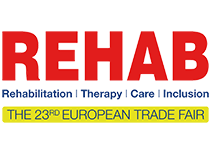Overcoming impaired hand function to master everyday life
From gripping to “getting a grasp of things” and “taking matters into one’s hands”, language places great symbolic importance on this seemingly everyday action. As small children, we learn about the world around us using our hands and fingers.

Grasping is an important part of development and being able to participate independently in life. This also applies to people with chronic illnesses and disabilities. The task here is to improve, retain or restore their ability to grip.
Many studies into people suffering from paralysis, rheumatism, the neurological effects of strokes or other conditions that cause a loss of hand and arm strength have repeatedly found hand function and mobility of the upper extremities to be essential to life.
In Germany, the focus on independent and autonomous activity was enshrined into law in 2020 with the Federal Participation Act (Bundesteilhabegesetz, BTHG). But in medicine, the change from seeing those affected as people in need of care to people capable of caring for themselves happened long ago.
Exhibitors present aids at REHAB
National and international manufacturers of living aids have risen to the challenges and responded with new technology throughout the period of the pandemic. The REHAB 2023 trade fair at the Karlsruhe Trade Fair Centre will showcase a broad range of arm and hand mobility aids for users of all ages and with a variety of conditions.

Kinova, a Canadian provider of robot solutions for people with disabilities, has added two dynamic arm support systems to its product range. The Gowing and Dowing help people who suffer from impaired arm function as a result of illness or accident. The products activate and support the residual force that many users still have in their arms.
The Gowing is a mechanical, flexible and tailor-made arm support that can be attached to any point on therapy chairs or furniture. It is also suitable for young children, helping them to perform tasks with friends of the same age and therefore gain independence.
Goal: Increase the quality of life
The Dowing is fitted with a motor and is designed for weaker patients. Despite the weight of the motor, the solution weighs less than the conventional robot arms that have been used to help patients with quadriplegia and muscle conditions for many years. Both products focus on using advanced technology to improve users’ quality of life and compensate for their disability.

HKK Bionics is a start-up founded by two medical engineering students from the German city of Ulm. They have developed the Exomotion Hand One: the first myoelectric hand orthosis for fully paralysed hands. The product resembles a glove and uses an arm splint to move artificial tendons via impulses from active muscle that is activated on the affected arm or in the back.
This lets the user move their fingers to perform a variety of gripping motions for eating, drinking or opening doors, for example. The clever solution has already proven popular among many medical and healthcare suppliers in Germany, who have made individual customisations to the fingers and splints.

The Carbonhand from Exxomove based in southern Germany enables patients suffering from multiple sclerosis (MS), arthritis or painful changes in the hand to enjoy an independent life. Much like the Exomotion Hand One, the product augments residual force using artificial tendons and fingertip sensors to perform the intended gripping motions. It can also be used in therapy and rehabilitation to develop strength and endurance.

The variable Tactee system from Neofect lets users grasp objects with their own hand and makes use of magnetic exchangeable accessories. The system is based on a hand adapter that is available in three sizes and is easy to put on. Various everyday aids are then attached using the patented magnet system. These include eating utensils, pens, toothbrushes, combs, a bottle holder and a range of other modules. These all support both older users with reduced gripping power and people with highly impaired neurological abilities due to a stroke, multiple sclerosis or other conditions.
Solutions like these all aim to grant users autonomy and independence, and therefore improve their quality of life. Germany’s Federal Participation Act places great emphasis on integrating affected people into everyday life and the workplace, regardless of their degree of impairment. It therefore also supports the people who need it most. Doctors and therapists involved in treatment must work together with users to determine needs in everyday life and participation. These requirements can then be used to select the right aid together with a medical supply store and apply for cost cover from the insurance provider.
All of the aforementioned aid products will be available to try out at the 22nd REHAB exhibition from 15 to 17 June 2023 at the Karlsruhe Trade Fair Centre. This will take place alongside the CON.THERA Interdisciplinary Conference for Therapists, which will offer practical training and professional development to therapists and specialists in rehabilitative and orthopaedic technology.

